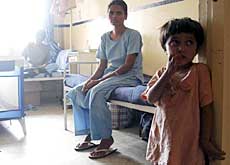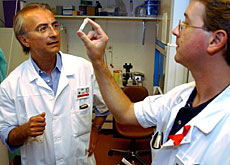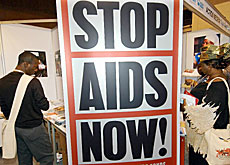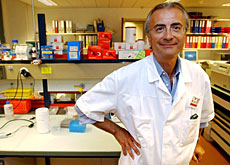Health experts seek support for Aids vaccine

Around 800 scientists and researchers are meeting in Switzerland for a major conference focusing on the search for an HIV/Aids vaccine.
The three-day gathering, which kicked off in Lausanne on Monday, aims to boost financial and political backing for vaccine research and development in Europe.
The participants also hope to strengthen joint research initiatives between Europe and the United States.
“There is an urgent need for a preventive vaccine to end the HIV pandemic in both the developed and developing world,” said conference chairman Giuseppe Pantaleo.
“This is a scientific challenge for a humanitarian cause,” he told swissinfo.
It is estimated that €10-15 billion (SFr15-23 billion) will be needed over the next ten years to guarantee adequate clinical development of the current vaccine candidates.
Lagging behind
According to Pantaleo, European countries lag far behind the US when it comes to funding and resources for vaccine research.
“Europe needs to wake up and make the same type of commitment to the vaccine field that there has been in the therapeutic field,” said Pantaleo, who heads Lausanne University Hospital’s immunology department.
He also points out that the US provides roughly 90 per cent of vaccine funding worldwide, while European researchers are left to find financing through poverty and disease prevention programmes.
The National Institute of Allergy and Infectious Diseases (NIAID) puts US government spending on Aids vaccine research at around $250 million (SFr320 million) per year.
“There is no equivalent European vaccine programme and this is what we need,” said Pantaleo.
Swiss support
The conference is being organised by Lausanne University Hospital and EuroVacc, a Swiss-based non-profit foundation whose mission is to develop a vaccine against HIV.
Swiss Interior Minister Pascal Couchepin – who holds the government’s health portfolio – officially opened the meeting, which is being attended by public health experts, pharmaceutical representatives and clinicians from around the world.
Couchepin called on the private sector, non-governmental organisations and lobby groups to cooperate in the fight against HIV/Aids.
Around 250 specialists from developing countries, as well as NIAID director Anthony Fauci and the Swiss Nobel Laureate, Rolf Zinkernagel, are also taking part in the conference.
“HIV vaccine development must be accelerated,” Fauci told participants at the event’s opening ceremony on Monday.
Zinkernagel said the development of an HIV vaccine was one the most challenging tasks for medical research.
Information exchange
It is hoped the participants will be able to exchange valuable information about the latest advances in vaccine development, including “promising” first results from clinical trials taking place in Lausanne (see related story).
Pantaleo hopes other countries will follow Switzerland’s lead in providing strong political support for HIV/Aids research.
“This is a public health problem but also a humanitarian problem,” he said.
“Switzerland is very sensitive to this issue and its commitment is in line with the country’s strong humanitarian tradition.”
Costly epidemic
More than 20 years and 20 million deaths since the first Aids diagnosis in 1981, almost 38 million people are living with HIV worldwide.
According to the United Nations Aids programme, UNAids, rates of infection are still on the rise in many parts of the world – including hardest-hit sub-Saharan Africa, which is home to 70 per cent of all HIV sufferers.
Last year alone, around five million people contracted HIV worldwide, including 4.2 million adults and 700,000 children under the age of 15.
It is believed that by the year 2010, another 45 million people will have become infected.
Although better anti-HIV therapies have been developed in the past few years, most experts tend to agree that it will take an effective vaccine to stop the spread of the virus.
Participants at this week’s meeting in Lausanne hope their combined efforts will result in just that.
“In addition to highlighting scientific advances, I hope that we will see a solid commitment among the different partners to move forward in the same direction as part of a global effort,” said Pantaleo.
swissinfo, Anna Nelson
Women account for nearly 50% of all people living with HIV worldwide.
Young people aged between 15 and 24 account for half of new HIV infections.
Only 7% of the people who need antiretroviral therapies in developing countries have access to them.
Global spending on Aids is just under $5 billion. An estimated $20 billion will be needed by 2007.

In compliance with the JTI standards
More: SWI swissinfo.ch certified by the Journalism Trust Initiative



You can find an overview of ongoing debates with our journalists here. Please join us!
If you want to start a conversation about a topic raised in this article or want to report factual errors, email us at english@swissinfo.ch.